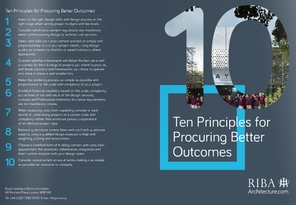Ten principles for procuring better outcomes
New Public Contracts Regulations came into force on 26 February 2015. In March 2015, The Royal Institute of British Architects (RIBA) published ‘Ten Principles for Procuring Better Outcomes’ to help decision-makers in public client organisations get the best outcomes when they procure architectural services within the framework of the new regulations.
The RIBA suggest that, ‘…sometimes as a result of poor procurement practice or lack of in house expertise, public clients don’t get what they expected and communities don’t get the buildings they deserve.'
The guidance covers setting fee levels, selecting the right procurement procedure, and simplifying the tendering process. It suggests that a range of different procedures can be used to procure design services suited to different project outcomes and that assessment of design quality should be central to decision-making.
The guidance says, ‘…procurement has often proved expensive and inefficient, and has sometimes produced poor quality and unsustainable buildings. Procurement regulations are commonly misinterpreted and misapplied to projects above and below EU thresholds. In some instances, decisions are made to manage cost and risk in the short-term without considering the project context or requirements in the long-term. This approach can inadvertently preclude the economic, social and environmental benefits of high quality outcomes, increase the cost to the public purse and exclude the most competitive, innovative and capable consultants.’
Broadly, the ten principles promoted in the report are:
- Invest in the right design skills and design process at the right stage when setting project budgets and fee levels.
- Consider which procurement regulations are mandatory when commissioning design or architectural services.
- Select and tailor your procurement procedure simply and proportionately to suit your project needs, using design quality as a means to shortlist or award contracts where appropriate.
- Question whether a framework will deliver the best value and outcomes for the full range of projects you intend to procure, and break contracts and frameworks you chose to operate into more numerous and smaller lots.
- Make the tendering process as simple as possible and proportionate to the scale and complexity of your project.
- Establish financial capability based on the scale, complexity, actual level of risk and value of the design services; turnover and Professional Indemnity Insurance requirements are not mandatory criteria.
- When assessing consultant capability, consider a track record of undertaking projects of a similar scale and complexity rather than extensive previous experience of an identical project type.
- Balance quantitative criteria (fees and cost) with qualitative aspects, using a qualified design assessor to help with weighting, scoring and assessment.
- Choose a standard form of building contract and consultant appointment that promotes collaboration, integration and direct communication with your design team.
- Consider consortia bids on equal terms, making it as simple as possible for consortia to compete.
On 11 February 2016, the RIBA launched the 2016 edition of Ten Principles for Procuring Better Outcomes at the Innovation Zone Local Government Association’s National Construction Conference. The revisions reflected feedback on how the rules were being implemented in practice. All local authorities received copies of the guidance with a call for contracting authorities already following the principles to become advocates for best practice procurement.
Featured articles and news
UKCW London to tackle sector’s most pressing issues
AI and skills development, ecology and the environment, policy and planning and more.
Managing building safety risks
Across an existing residential portfolio; a client's perspective.
ECA support for Gate Safe’s Safe School Gates Campaign.
Core construction skills explained
Preparing for a career in construction.
Retrofitting for resilience with the Leicester Resilience Hub
Community-serving facilities, enhanced as support and essential services for climate-related disruptions.
Some of the articles relating to water, here to browse. Any missing?
Recognisable Gothic characters, designed to dramatically spout water away from buildings.
A case study and a warning to would-be developers
Creating four dwellings... after half a century of doing this job, why, oh why, is it so difficult?
Reform of the fire engineering profession
Fire Engineers Advisory Panel: Authoritative Statement, reactions and next steps.
Restoration and renewal of the Palace of Westminster
A complex project of cultural significance from full decant to EMI, opportunities and a potential a way forward.
Apprenticeships and the responsibility we share
Perspectives from the CIOB President as National Apprentice Week comes to a close.
The first line of defence against rain, wind and snow.
Building Safety recap January, 2026
What we missed at the end of last year, and at the start of this...
National Apprenticeship Week 2026, 9-15 Feb
Shining a light on the positive impacts for businesses, their apprentices and the wider economy alike.
Applications and benefits of acoustic flooring
From commercial to retail.
From solid to sprung and ribbed to raised.
Strengthening industry collaboration in Hong Kong
Hong Kong Institute of Construction and The Chartered Institute of Building sign Memorandum of Understanding.
A detailed description from the experts at Cornish Lime.
























